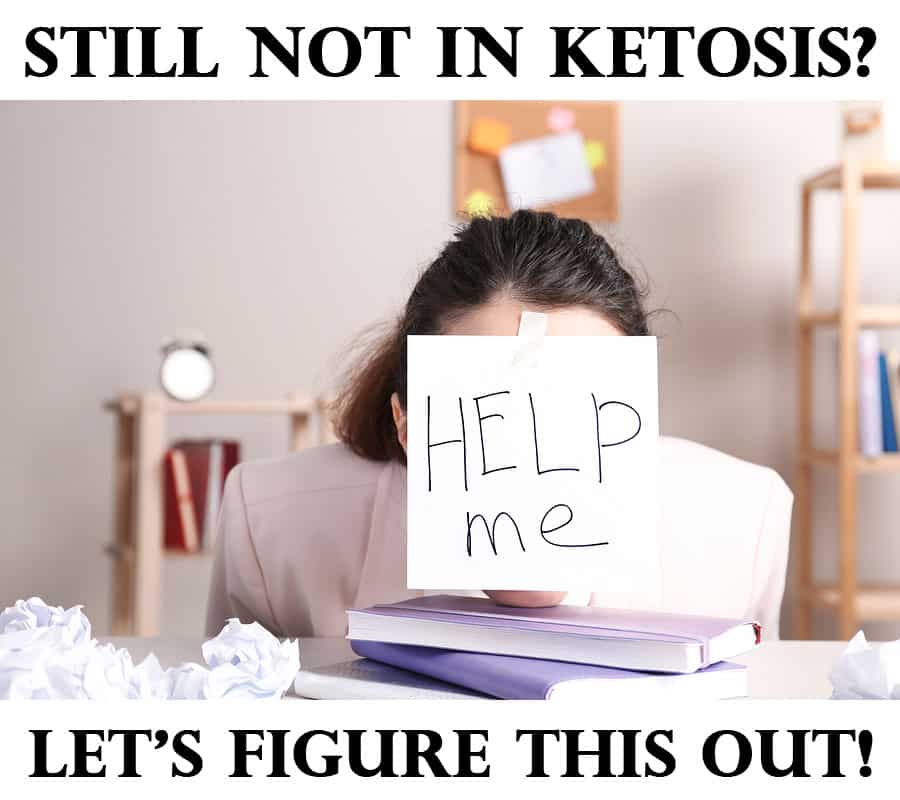Why Am I Not In Ketosis?
This site may contain links to affiliate websites, and we receive an affiliate commission for any purchases made by you on the affiliate website using such links.
Have you been eating Keto faithfully for a while but are frustrated that you don’t seem to be in ketosis? Don’t worry! It’s very possible you actually are in ketosis. And even if you’re not, don’t give up.
If you think you’ve been doing everything right when starting a keto diet, but are still not in ketosis after three weeks, the cause is usually one of three things: Bad test strips, Too many carbs, Too much protein. It’s best to start looking for other signs of ketosis.
If you’re measuring ketosis with urine test strips, they may be inaccurate or have gone bad, giving an incorrect reading.
A blood meter is the most accurate way to measure ketones, but they are expensive.
Learn to identify ketosis by how you feel, which is powerful since this way of eating is a lifestyle, not a short-term fix.
Some people do take longer to transition into ketosis, due to health conditions and/or medications.
First of all, don’t worry! You are not alone. I hear from a lot of new Keto eaters who think they are not in ketosis, even if they’ve done “everything right.”

Are You Doing Everything Right But Not In Ketosis?
Let’s start with the basics. Are you following The Rules of Keto?
Specifically, are you keeping track of your macros, so you know for sure that your daily carbs are under 25 net grams?
Have you increased your fat intake so your body knows that your new fuel source is plentiful?
These two things are important in the beginning of your journey to help your body through the transition from a sugar burner to a fat burner.
Next let’s talk about how you are checking to see if you are in ketosis and if that might be the problem.
Then, we’ll talk about why you might not be in ketosis yet.


Ways To Know If You Are In Ketosis
How are you testing to see if you are in ketosis? The method you are using to test might be part, or all, of your problem.

Using Urine Test Strips Tell If Your Body Is In Ketosis
Many people use the urine strips, including myself, at the beginning of their Keto journey. They are a nice, cheap tool, and usually, they are a fine way to determine whether you are producing (and excreting) ketones, even if they are less than accurate regarding the amount of ketones.
Urine strips do not last very long! They go bad quickly, as I wrote about in this article. Particularly in humid environments (like a bathroom), the strips have a short shelf life. I have never had a bottle last until the expiration date.
In my experience, a batch of urine strips will work for about 30 days before going bad. This is the number one reason that I often see when people think they have not reached ketosis. Buy new strips! Here is an Amazon affiliate link to the brand that I use.
What the urine strips measure is the amount of ketones that you excrete through your urine. These are the ketones that your body produced but didn’t use.
When you first start keto, your body is not used to being in a ketogenic state and using ketones for fuel; it takes some time (at least six weeks) to get efficient at using ketones. So during the transition into ketosis, newbies often excrete high amounts of ketones, and these show up on the urine strips.
However, this is not always the case. Some people excrete less, and that’s actually a good thing! It means your body is using the ketones that you make, and that is what you want. The color on the urine strip does not equal your state of ketosis. It only equals the amount of ketones you pee out.
As you continue on your Keto journey, you may find that in time you will never test positive on the strips, even though you know you are in ketosis (see below for ways to determine without a testing tool!)
This is simply because you become really good at using ketones for fuel.
The reading on the strip can also be affected by other factors, like fat intake, exercise and dehydration.
Ketones are a by-product of fat metabolism. Early in your transition to ketosis, you want to eat plenty of fat so your body has the means to make ketones without using your stored body fat. You want this at the beginning so your body doesn’t think it’s in starvation mode.
Once your body has adjusted and knows that fat is now plentiful and has all the machinery in place to use it as fuel, then you can eat less fat and your body will be comfortable burning your fat stores.
If you eat a lot of fat on a particular day, then your body will make more ketones. If you don’t need those extra ketones for fuel, you’ll excrete them in your urine and your reading will be higher.
If you do a lot of heavy exercises, you will need those ketones for fuel. You’ll excrete less and your reading on the strip will be lower.
Drinking lots of water can sometimes dilute your reading, making it look like a lower amount than you are actually excreting. On the other hand, if you don’t drink enough water, the color will often be darker on the strips because there is less dilution.
As you can see, these and other factors can easily affect the reading on the urine test strips and make it seem like you are not in ketosis. Don’t worry, there are other ways to tell!

Blood Ketone Meter To Test For Ketosis
The most accurate testing method is a blood ketone meter. Blood meters measure the amount of beta-hydroxybutyrate (BHB) in your blood. This is one of three major ketone bodies that you will produce when in ketosis, and it is the most prominent in the bloodstream.
When using a blood meter, you prick your finger and place a drop of blood on the test strip, which is inserted into the meter itself. As long as you follow the directions with the device and make sure your hands and the device are clean, there are not very many ways to affect the reading. That’s what makes this method so accurate.
However, it is also more costly than urine test strips. The meter I use is the Keto Mojo Blood Ketone Meter (linked to Amazon) and I love it. You can get a kit that includes the meter, lancing device to prick your finger, and some ketone test strips for about $60. You can only use each test strip once and refills run about $1 per strip. If you test a lot, that adds up fast.
But if you’re like me, and you want in-depth information about how specific foods, activities, or life events affect your level of ketosis, the blood meter is the way to go.
The meter will give you a reading in millimoles per liter (mMol/L.) Nutritional ketosis is usually recognized as .5 mMol/L or more. Levels for optimum ketosis for weight loss, brain function, and high energy levels vary by individual. Somewhere between 1.5 and 3.0 is generally recognized as “optimal”.

Signs and Symptoms of Being In Ketosis
Tools for measuring ketones are actually not necessary. You can totally feel it when you are in ketosis.
When you know what to watch for, once you feel the difference you can recognize that state and rest assured. And after you’ve been Keto for a while, the absence of most of these symptoms is a sign that you have slipped out of ketosis and need to dial it back in again.
Did you have a period of rapid weight loss (5-10 pounds in one week)? This is the initial water weight that you lose when you no longer need that extra water to metabolize carbohydrates.
Did you experience Keto flu and come out of it without increasing your carb intake?
Have you noticed a decrease in appetite?
Does hunger feel different and not as urgent?
These are all good indicators that you are in ketosis.
Other indicators that you may notice:
- Keto breath (smells fruity but not in a good way – this is the excess of the ketone called acetone being excreted and it is temporary)
- Increase in energy
- Better mental focus and clarity
- The decrease in carb cravings
- Less joint pain
- Lower blood pressure
- Better moods and improved anxiety
- Better sleep
- Increased libido
Why You Might Be Eating Low Carb But Not In Ketosis
Assuming that you’re tracking so you know there aren’t any sneaky carbs that are derailing your efforts, you may want to look at your protein and fat intake and find adjustments that work for your body.
Carbs. Use an app like Carb Manager or MyFitnessPal to track all the food you eat. Make sure that you are keeping your daily carbs under 25 net grams. (Total carbs minus fiber equals net carbs.)
If you are using artificial sweeteners like Splenda, NutraSweet, or Sweet ‘n’ Low or even more natural keto-friendly sweeteners like Swerve (erythritol), stevia or monk fruit extract, these can cause problems for some people. Just the taste of sweet can trigger a hormonal reaction, increasing your insulin levels and interfering with ketosis.
During the transition away from a carb-based diet and lots of sweets, these zero-carb sweeteners can be very helpful to keep you on track. While I don’t think everyone has to avoid sweeteners, if you’re really having trouble reaching ketosis, this would be one of the first things I would remove to see if it helps.
Protein. Some people notice that if they keep their protein on the lower side (around 15% of daily calories), they are better able to achieve ketosis. The reasons for this are hotly debated but I have experienced it myself. Other people respond better to higher protein levels.
The best way to know what will work is to try it for yourself. Adjust your protein intake either up or down, depending on what you suspect will work best for you, for a few days. Take note of how you feel, your energy levels, and your hunger levels, along with testing for ketones.
Fat. As I discussed above, keeping your fat intake high (between 70-80% of daily calories) is very important during the first part of your Keto journey. If you’re having trouble incorporating more fat into your diet, check out my article on Fat Boosters. It’s full of helpful ideas and recipes to incorporate more delicious fat in your meals!
If you are following all these suggestions and are still not in ketosis, that’s ok! I know it’s frustrating but don’t give up.
For some people, it just takes a little longer. Insulin resistance, leptin resistance, and all sorts of other metabolic conditions can take time to adjust. If you’re on any medications, they can affect things, too. Make sure you are working with your doctor if you are on meds!
Stick with it. Eliminating high carbohydrate foods will help improve your health, whether you are in ketosis or not. It will come!
~Angela

Disclaimer: While I have been keto for over a decade and have guided thousands of people through starting a keto diet, I am neither a licensed nutritionist nor a medical professional. I never prescribe diets. I only share my personal experiences and those of my clients for informational purposes only. Nutrition details are provided for informational purposes only, and should not be considered medical nutritional data. You should consult your medical professional before making any major changes in the way you eat.
~Angela


I just want to say thank you very much for taking the time to write your own experience with the Keto diet. It helped me to understand much better what exactly is going on within my body right now.
Thank you so much I have been on the keto diet for almost 4 weeks and I have had the keto flu I also have started preparing my own meals and try to had extra protein like chicken and other meats but I’m still not for sure what are the best vegetables to eat or are good with stir fry I am going to share your sight with others again thank you so much for sharing
I am very active. I keep a low-carb diet due to using some carbs for exercise, but not more than 40 per day. I have been water-fasting for 4 days (87 hours) and have super low ketone readings. I worked out and almost got kicked out. Is there something to this I should be concerned about. I have always measured myself against others, and it is clearn that I might have to go 8 days fasting to actually get a deep keto reading.
Any knowledge, advice, or comments are much appreciated.
Thanks.
V
Valerie – While I obviously cannot give you a surefire reason, as I don’t know your whole situation and I am not a medical doctor, I can tell you from my own experience that ketone readings do not tell the whole story. When I am deep in ketosis and working out regularly, I often show very low readings on the blood ketone meter. There is much we don’t know about how exactly ketone levels change due to different factors, and this is complicated by the fact that each individual body produces and uses ketones differently. My guess is that your (and my!) ketone readings are low because you are using all the ketones that your body is producing! This is a good thing. It means that your body is very efficient, producing the amount of ketones that it needs and then using them accordingly.
I know it’s hard, but don’t measure yourself against other people. Your body is not the same as anyone else’s. And it sounds like it’s doing a pretty great job!
I have been on keto, keeping strictly to a 70/20/10 diet for 14 days with reduction of about 300 calories per day lower than my BMR. I also have been getting minimum 20 minutes of exercise a day. I also run after a toddler and a 7 year old all day, so busy, getting in my 10,000 steps a day minimum. My 10% of carbs, is usually fluctuating between 17-23 net carbs per day. I drink 8-12 glasses of water a day depending on whether I exercise or not. All food and exercise, water, etc. goes into my Net Diary. I have lost 6 lbs, which I can guarantee is water weight. I have started checking my keto via blood strips daily the past week and not one bit of ketones in blood. The only health improvement I have noticed was the initial drop in water weight, so I am feeling less bloated and my skin has obviously improved because of lack of sugar. What up with not being in ketosis?
Kim – You’re doing great! Congratulations on a wonderful start to your Keto journey. The fact that you’ve lost the initial water weight is a good thing. That means that your body is making the transition away from using carbs as it’s main fuel source, so it no longer needs that extra water. Two weeks is very early in the process, so don’t read too much into the ketone readings. While a lot of people will start seeing ketone levels rise in the first few weeks, this is not the case for everyone. Each individual body has its own priorities, and your body may be working on metabolic improvements. These internal changes are vital to health, and they sometimes needs to happen first before you start to see external signs and improvements.
While I obviously don’t know your whole health situation, I would guess that you’ve got some other, probably inflammatory, issues that your body is working on. I know we all want to see immediate outward changes, but health is the goal. Weight loss is a side effect of health, and it will come.
Also, keep in mind that stress will interfere with weight loss. That includes all stress, including chasing kids, exercise, and general life during a pandemic. Trust the process and give yourself some grace. You’re doing great things for your health!
Over 3 weeks on keto -I don’t have hunger so I may be in ketosis but my frustration is that I have only lost 1 pound the first week. 2 ounces the second week. and NOTHING the 3rd week.
Been counting my macros like a hawk. My husband and daughter started the same time and they have lost 12 and 9 lbs.
Im exercising-walking ,hit training, rebounder, yard work.
Im on a non statin cholesterol drug low dose for high circulating mold mycotoxins.
so inflammation? any ideas for me?
Lynda – You’re doing great! I know you want to see the scale move, but your body has got a lot going on, and it may take time. Keep at it. Keto can be very helpful for lowering inflammation, and you will likely see those results with a little time.
The scale is not your friend! Watch how your clothes fit. Take measurements and pictures. These are much better indicators of progress, and they can change dramatically without anything changing on the scale. You can do this!
I have been fasting 15 hours a day for 2 and a half weeks. I have been following the keto diet. But when I test for ketones using strips, it always comes out negative. I do not seem to be loosing much weight. I use a app for keto. very frustrated.